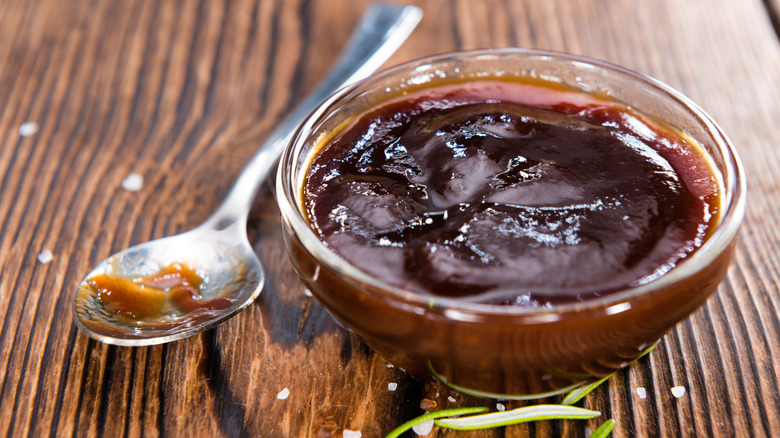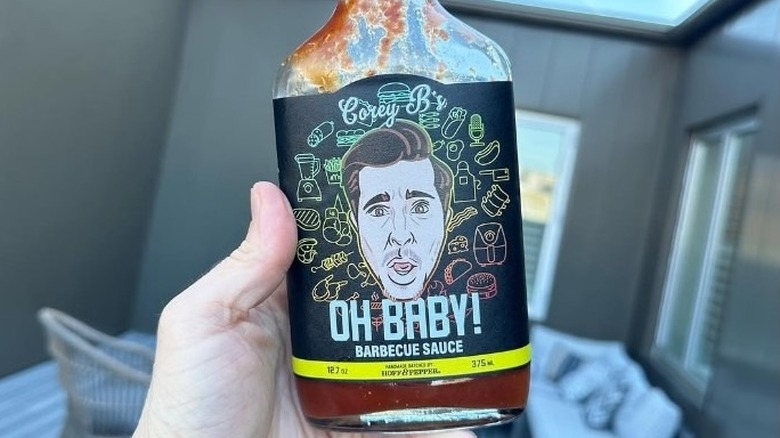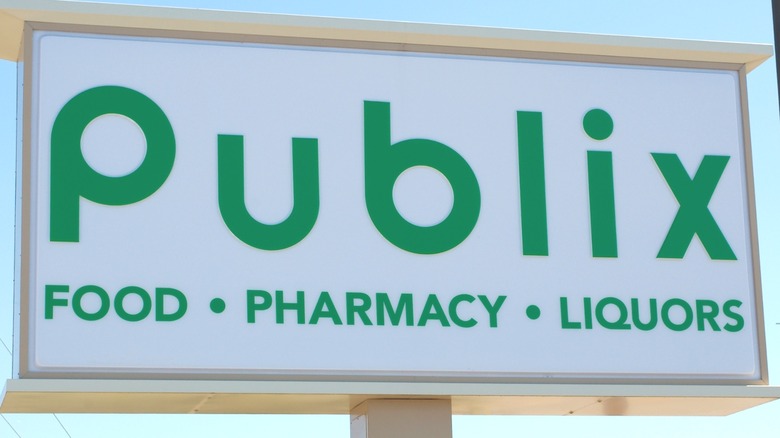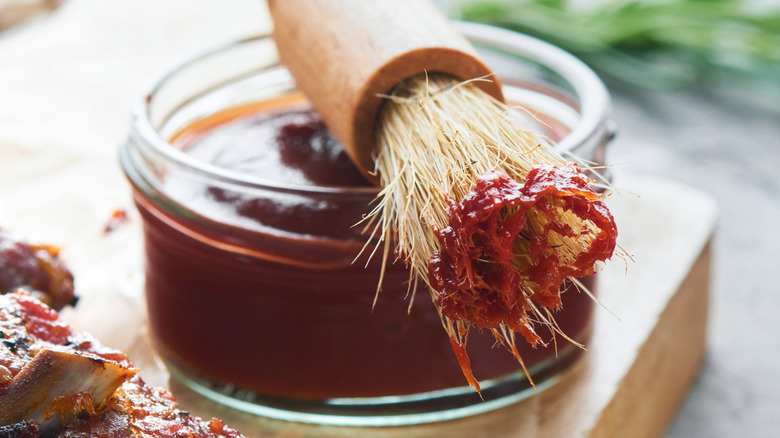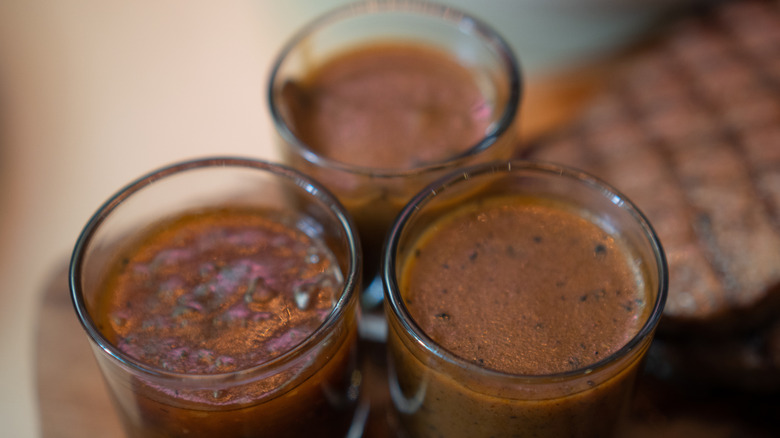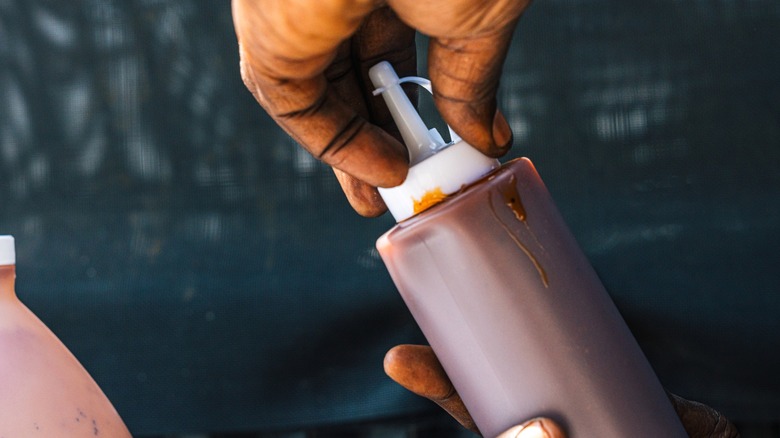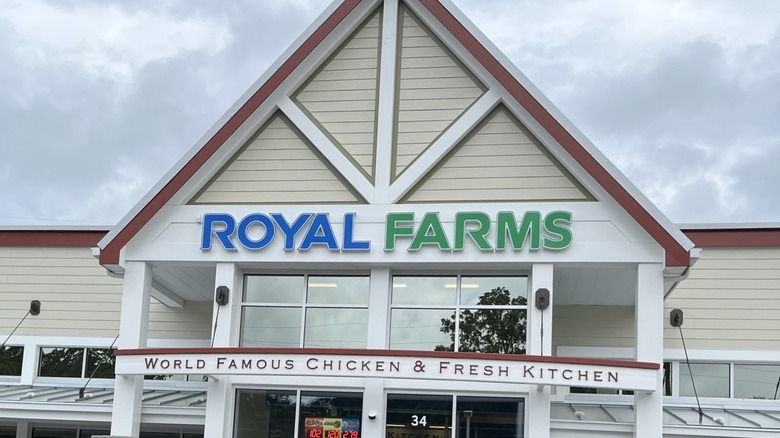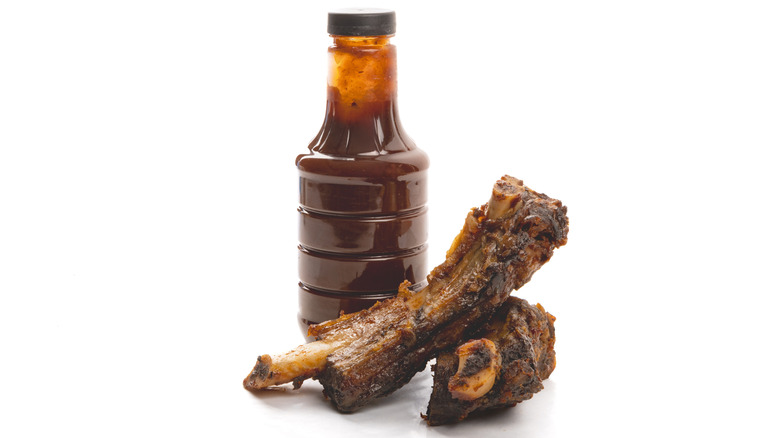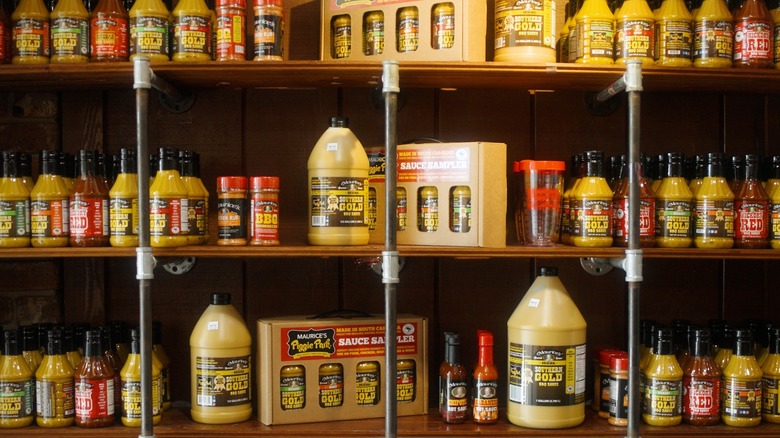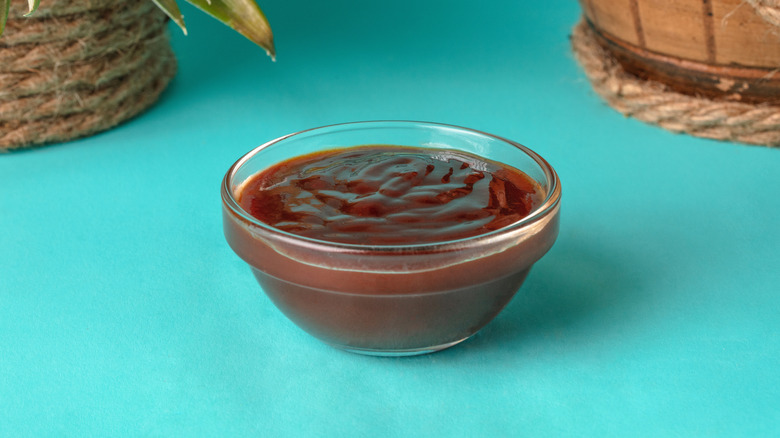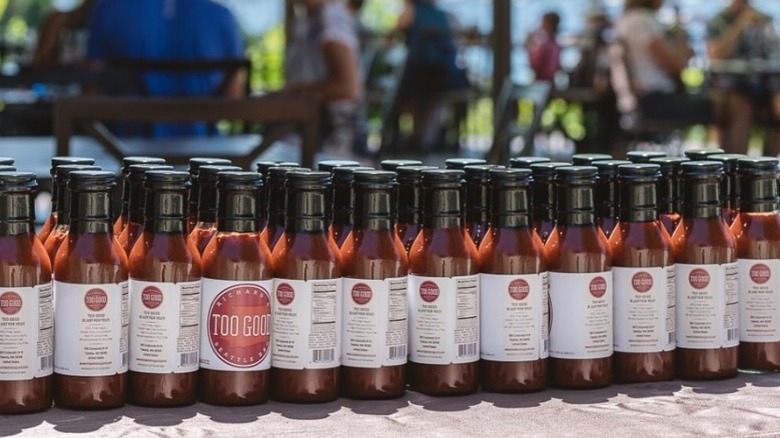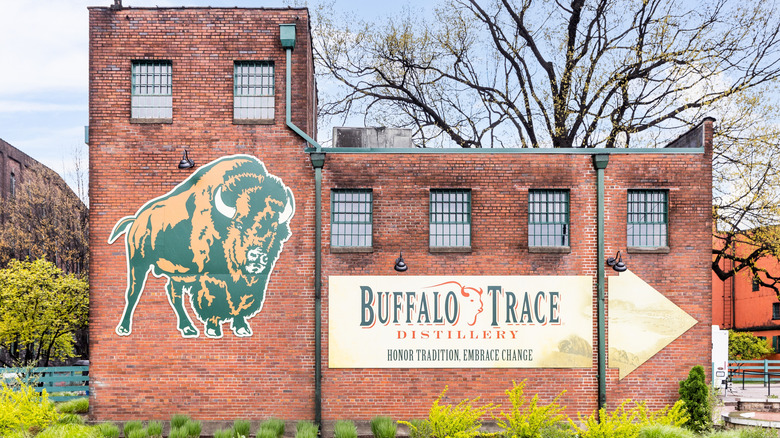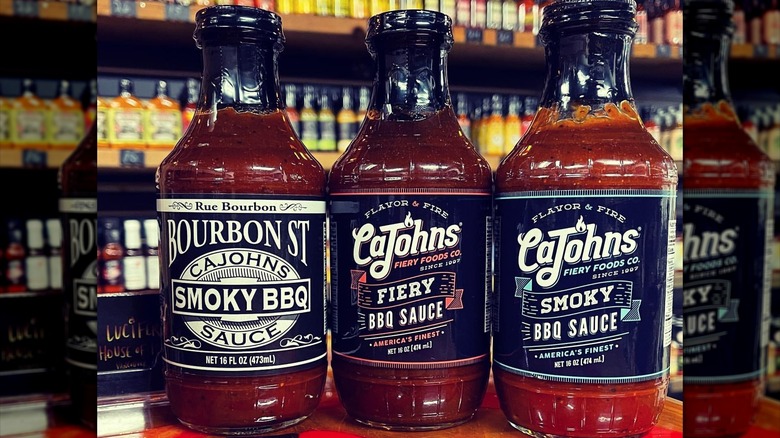The Biggest BBQ Sauce Recalls In US History
Between grocery store brands, barbecue restaurants, enterprising chefs, and even some bourbon distilleries, the number of food businesses all producing their own bespoke BBQ sauces is vast. It's hardly a surprise, then, that some of these businesses have erred over the years and found their BBQ sauces subject to recalls.
Whereas the most deadly recalled foods in U.S. history have caused illnesses and even death, no recalled BBQ sauce has ever seriously harmed an unwitting customer. Nevertheless, plenty of BBQ sauce recalls have encompassed large amounts of product or presented theoretical danger. Each of these BBQ sauce recalls, organized in reverse chronological order, was selected for its quantity — based on data compiled by the Food Industry Counsel — or potential deadliness.
For what it's worth, food recalls are becoming increasingly common, not necessarily because food is more dangerous, but because prevention initiatives are improving. So, the most significant BBQ sauce recalls don't date back to the genesis of BBQ sauce, but the mid-2000s, simply because significant recalls are a relatively new phenomenon. With that in mind, the following are each of the biggest BBQ sauces recalls in the history of the United States.
Over 3,000 pounds of Corey B's official BBQ sauce were recalled for undeclared allergens (2024)
Hands down the most common reason for major BBQ sauce recalls is undeclared allergens. This refers to a lack of text on the sauce's label indicating the inclusion of an ingredient or ingredients that may aggravate common food allergies. In one of the most notable examples, in July of 2024, Tennessee-based sauce company Hoff & Pepper recalled 3,345 pounds of a BBQ sauce branded with the likeness of content creator Corey B, called Corey B's Oh Baby! Barbecue Sauce. At fault was the undeclared presence of wheat.
Those thousands of pounds of sauce encompassed a total of 4,248 bottles. They were distributed to almost all 50 U.S. states in addition to a few locations abroad. As it so happens, Hoff & Pepper announced its closure just under a year later, in April of 2025, citing financial difficulties as the principal cause. While the Corey B's BBQ sauce recall wasn't explicitly cited as a contributor to this decision, it stands to reason that recalling thousands of bottles of a flagship product worsened matters during what was presumably a difficult time.
Publix recalled over 4,500 pounds of Carolina BBQ sauce for undeclared anchovies (2024)
Another major undeclared allergen recall affected grocery store chain Publix just months prior to the Hoff & Pepper incident, in January of 2024. A total of 4,704 pounds of what was supposed to be Carolina-Style Mustard BBQ Sauce, sold in Publix delis, were implicated for possible undeclared anchovies. The recalled BBQ sauce was identifiable by one specific best-by date.
The company responsible for producing BBQ sauce for Publix delis was called Ventura Foods, based in the Orange County, California city of Brea. The recalled sauces, however, were distributed exclusively to seven states in the Southern U.S. The reason these particular packages of so-called Carolina-Style Mustard BBQ Sauce were recalled was that they were determined to potentially contain a different product entirely, called Traditional Sweet & Spicy BBQ Sauce. That latter product contained anchovies, whereas the former didn't, hence the erroneous labeling. Customers were encouraged to return recalled cups of BBQ sauce to a Publix store for a full refund. No allergic reactions were ever publicly linked to the faulty product.
Fresh Chile Company recalled over 12,500 pounds of BBQ sauce for undeclared anchovies (2023)
Undeclared anchovies had a bit of a moment in the early 2020s. The second of three major undeclared anchovy BBQ sauce recalls was instituted in August of 2023. A total of approximately 12,538 pounds of Sweet & Spicy BBQ Sauce produced by a company based in New Mexico called The Fresh Chile Company were affected.
It was specifically 11,398 glass jars of medium and hot variants of Sweet & Spicy BBQ Sauce that were encompassed by the recall, identifiable by 13 distinct lot numbers between the two different products. Jars of the mislabeled BBQ sauce were distributed through three channels: wholesale, online sales, and a gift shop at the Fresh Chile Company HQ in Las Cruces. Overall, just 81 recalled jars were sold in the gift shop between June 2022 and April 2023. Meanwhile, the company distributed the recalled jars to 28 wholesale customers, presumably in large quantities. The volume of individual online customers was never specified. Jars of recalled BBQ sauce that had yet to be sold were retained by The Fresh Chile, and in dramatic fashion, placed under quarantine.
Over 10,000 pounds of two Schaws Sauce flavors were recalled for undeclared soy and anchovies (2020)
The first of three undeclared anchovy recalls in just over a three year span happened in August of 2020. Behind the recall was a company called Schaws Sauce. Two of its products — Sweet and Sassy Barbecue and Basting Sauce and Sweet with Heat Barbecue and Basting Sauce — were made with Worcestershire sauce, which some might not know is a common BBQ sauce ingredient. That particular brand of Worcestershire sauce contained both soy and anchovies, neither of which was properly reflected on either product's label.
The recalled sauces were identifiable by a use-by date on or before August 20, 2022. The fact not just that one date but all prior dates were included suggests that both sauces had failed to properly convey their soy and fish content for the entire time they were in production. Schaws Sauce sold its products primarily in its home state of Michigan, but online sales expanded the scope of recalled sauces to, theoretically, anywhere in the U.S. A total of 9,112 jars, adding up to 10,251 pounds of BBQ sauce ended up implicated by the recall.
Pepper Source recalled over 20,000 pounds of BBQ sauce over the potential to contain foreign material (2020)
In February of 2022, a company called Pepper Source instituted a sizable recall of 21,194 pounds of its Honey BBQ Sauce. At fault was the possibility the product might erroneously contain inedible material. It's worth noting that Pepper Source does not sell directly to consumers, but produces custom sauces for food businesses.
It's unclear whether or not the scope of the recall included other businesses with some iteration of Pepper Source's Honey BBQ Sauce for sale. Suggesting that this was not the case, the recalled product's packaging was described as multi-gallon totes rather than individual bottles or jars, reflecting the bulk quantities Pepper Source would have produced in-house. The precise nature of the inedible material is unspecified, but it was described as some sort of food packing component. Presumably, then, something that was meant to package the sauce mistakenly ended up in the sauce, and the recall was a preemptive measure to prevent distribution of products containing that packing material.
World Flavors recalled nearly 18,000 pounds of both Cheese Whiz and BBQ sauce over the potential to contain foreign material (2020)
Just as there were multiple anchovy-related BBQ sauce recalls in a relatively short time span, a significant foreign material recall preempted the Pepper Source incident by just one month. Namely, in January of 2020, a company called World Flavors, Inc. recalled both a Cheese Whiz and a BBQ sauce after a foreign material was found in starch that was used in the production of both products. The company's ingredient supplier identified the tainted starch, so for what it's worth, the issue didn't originate with World Flavors.
Further likening this case to the Pepper Source recall, World Flavors also makes custom sauces and other products for food businesses rather than dealing directly with individual consumers. Accordingly, the listed form factor for the recalled Cheese Whiz and BBQ sauce was large bags and not bottles or jars. It was only two customers to whom the recalled product was distributed, so the majority remained with World Flavors. The quantity of Cheese Whiz and BBQ sauce affected by the recall added up to a sizable 17,640 pounds in total.
Over 4,500 pounds of Royal Farms BBQ sauce cups were recalled for actually containing wing sauce (2019)
When producer Sauer Brands, Inc. recalled 4,745 pounds of BBQ sauce cups sold in Royal Farms stores, it wasn't actually BBQ sauce that was affected by this recall. But because the recalled product was, at least, intended to be BBQ sauce, this incident still earns a spot on this list.
Specifically, 222 cases of plastic Royal Farms Barbecue Dipping Sauce cups were recalled from a Pennsylvania distribution center after it was determined those dipping cups erroneously contained wing sauce. Beyond just the potential to bamboozle customers, the error meant that the Barbecue Dipping Sauce cups technically contained an undeclared allergen — Sauer Brands' wing sauce was made with soy lecithin, a potential allergen that was unlisted on the BBQ sauce cup packaging. Since the product had yet to leave the distribution facility, no customer ever purchased wing sauce under the guise of BBQ sauce, but the thousands of pounds of recalled product make this an impactful incident all the same.
Almost 30,000 pounds of Monarch BBQ sauce were recalled for improper labeling (2019)
In February of the same year Sauer Brands recalled thousands of pounds of Royal Farms Barbecue Dipping Sauce cups, The SF Sauer Company — which is under the corporate umbrella of Sauer Brands — also instituted a recall for Monarch branded Southern BBQ sauce. At fault was packaging that lacked almost every informative component.
Apparently, the label on the recalled BBQ sauce did little more than identify that the product within was, in fact, Monarch's Southern BBQ sauce. Missing entirely was nutritional data, an accurate UPC code, a declaration of potential allergens, and even its list of ingredients. The danger posed by this effectively unlabeled BBQ sauce earned a Class I recall classification from the FDA, which means the FDA found this incident to pose the highest possible level of risk. Of course, it probably wasn't the missing bar code but the lack of allergen indicators that the FDA found to be primarily at fault. Altogether, The SF Sauer Company recalled 928 cases of gallon jugs, adding up to 29,696 pounds, of the improperly labeled Monarch BBQ sauce.
Piggie Park recalled two years worth of BBQ sauce for undeclared allergens (2018)
In March of 2018, Piggie Park Enterprises, Inc. — parent company of Maurice's Piggie Park BBQ restaurants and Maurice's bottled sauces — recalled a total of 19,143 pounds of Maurice's Southern Gold Honey BBQ Sauce. Necessitating the recall was the presence of two undeclared allergens.
The inciting incident for this massive recall was the Piggie Park company learning that powdered honey it used in its Southern Gold Honey BBQ Sauce contained both soy and wheat. Since the company seemed to have no knowledge of this fact prior, a whole two years worth of sauce was affected, identifiable by manufacturing dates between March 11, 2016 and March 11, 2018. Not all undeclared allergen recalls warrant a Class I label from the FDA, but perhaps due to the combination of scope and multiple allergens, this case did, in fact, earn the Class I categorization. The mislabeled products were sold at retail stores in just Georgia, North Carolina, and South Carolina, but available to customers throughout the U.S. in the company's online store.
Carriage House recalled roughly 6,000 pounds of basting sauces and BBQ sauce for undeclared allergens (2017)
A company called Carriage House Creations had to recall 6,036 pounds of Bourbon Basting Sauce and Hot Barbecue Sauce in January of 2017 for concerns over undeclared allergens. Just like the Schaws Sauce recall that was to come in August 2020, unsuspecting allergens in a Worcestershire sauce used as an ingredient in both items was at fault. However, rather than anchovy, it was soy and peanuts that were unlabeled in this case.
Carriage House Creations is based in Pennsylvania, and all of its in-person distribution was limited to 11 cities in its home state. That said, sales of Carriage House products were not just relegated to retail stores in those cities, but various gift shows and festivals too. Complicating matters, as is often the case, were sales made online and through mail order. Altogether, mild, medium, and spicy versions of the basting sauce, in addition to the one spicy BBQ sauce were implicated by the recall. Customers were encouraged to return any mislabeled products to either the point of purchase or by contacting the company directly.
Richard's Too Good BBQ Sauce was among a few Richard's sauces recalled for the potential to cause botulism (2014)
The bacteria responsible for botulism — a rare but potentially life threatening disease — has been the culprit behind many of the biggest canned vegetable recalls in U.S. history. In June of 2014, Washington State-based Richard's Rubs & Seasonings LLC recalled three products for the risk that they might carry the bacteria that causes botulism. The affected items were Richard's Too Good Hot Sauce, Richard's Too Good Teriyaki Sauce, and Richard's Too Good BBQ Sauce.
For what it's worth, the quantity of products recalled was never publicly stated, and the scope of their distribution was limited to just grocery stores and butcher shops in Western Washington. That said, this was a rare BBQ sauce recall instituted over life-threatening bacteria and not just a faulty label, earning its spot among the biggest BBQ recalls in U.S. history all the same. What tipped off Richard's Rubs & Seasonings to the possibility its products might carry the dangerous bacteria was a customer complaint that suggested these products were improperly processed. Fortunately, no reported illnesses were ever linked to a Richard's Rubs & Seasonings sauce, BBQ or otherwise.
Buffalo Trace Distillery recalled over 4,500 pounds of BBQ sauce and other products for undeclared allergens (2013)
While the presence of undeclared allergens may be a frequent cause for large BBQ sauce recalls, it's not every day that these sorts of incidents occur at one of the 20 distilleries every whiskey lover must visit before they die. Such was the case in March of 2013, when the Sazerac Company's Buffalo Trace Distillery recalled 4,632 pounds of various sauces from its gift shop.
The five products named in this recall were a Bourbon Flavored Caramel Sauce, a Bourbon Flavored Fudge Sauce, a Marinade for Meat, a Barbecue Sauce, and a Hot Barbecue Sauce. Each of these products were recalled in their entirety, regardless of lot number, indicating that their labels had never declared the common allergens they contained. In the case of the two BBQ sauces recalled, both soy and anchovy were unlisted as allergens. Beyond just sales in Buffalo Trace's gift shop itself, the faultily labeled products were distributed to grocery stores and liquor stores, in addition to individual consumers through online sales in 27 states. The confluence of multiple allergens and a wide distribution network earned this recall Class I categorization from the FDA.
CaJohns recalled six different BBQ sauces for various undeclared allergens (2005)
CaJohn's Fiery Foods is a hot sauce company that originated in Ohio and now operates out of North Carolina. One of the company's claims to fame is Trouble Bubble, which inspired a TikTok spicy gum trend requiring ample caution from its participants. Also part of the brand's product lineup, of course, are BBQ sauces, six of which it recalled in May 2005. As is most often the case for BBQ sauce recalls, undeclared allergens were at fault.
The issue was that the recalled sauces listed soy sauce and/or Worcestershire sauce as ingredients, but failed to individually declare the soy, anchovies, and wheat they contained. This likely describes similar undeclared allergen cases as well, but it just so happens that the 2005 CaJohn's incident is the only one where the nature of this mistake was outlined explicitly. The quantity of affected products was never publicly released, but its scope did encompass both retail outlets and online buyers throughout the United States. The FDA determined that this qualified as a Class I recall.
